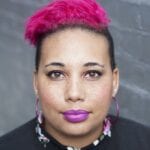On Nov 9, I woke up and Donald Trump was president.
Someone who has been accused of sexual assault, who is known to have harassed women, who openly and explicitly projects racist and anti-immigrant sentiment, who chooses capitalism over humanity and is just an all-round orange douchebag is now the most powerful man in the world.
The feeling in the bottom of my stomach was a disgusting mix anger, sadness, pity and despair. This wasn’t a rare or unique feeling; so many people, particularly marginalized populations including women, queer and trans folks and people of colour, were undoubtedly feeling the same emotions.
For me, it was a case of déjà vu.
I had felt almost these exact feelings just months before. I saw the same impatient angst of watching deceitful campaigning enticing people with privilege to make foolish decisions. I witnessed the same anti-immigrant hysteria, the same racist scapegoating, the same pandering to white fear, culminating in a slightly embarrassing but also dangerous political outcome.
On June 23, 2016, a referendum was held in the United Kingdom to let the people of Britain decide if their country should remain a member of the European Union. Fifty-two percent of voters voted to leave.
It was an unsurprising outcome considering certain groups had been campaigning for a withdrawal since the early 1990s. What was surprising though, was the unfounded and unabashed display of racial hatred and anti-immigrant paranoia that both fueled the outcome and provoked violence following it.
Brexit had shaken me the same way that the election of Trump shook black and brown people, queer and trans communities and other marginalized populations of America.
From a Brexit survivor to America — I feel you.
I feel the pain of being shaped by a nation and actively contributing to its prosperity and diversity, only to now be the victim of its backward politics. Queer and trans people, racialized people and especially those who live on the intersection of both, contribute in proportional amounts to the prosperity and success of both Britain and America. While these countries are founded on colonial and capitalist notions of civilization, which many of us actively reject and are victim to, we nonetheless play essential roles in keeping our countries afloat. We are important and valuable parts of these societies.
We, in so many ways, quite literally laid the foundations for these countries to exist. So, for our white fellow country-people to vote in favour of racism, is a sad and painful betrayal. The election of Trump and Brexit says to people of colour, “you don’t belong here.”
I am black and I am British. I know nothing else because growing up in England meant being taught Eurocentric history and never having the opportunity to learn about my African and Caribbean ancestors. The way I know and relate to blackness is specifically through Britishness. It is travelling to the other side of London to get the right hair products for my afro; it is friends switching between Jamaican patois or West African Pidgin into thick London slang; it is being called the N-word by white people on my way home from school; it is getting Gambian cultural dresses made in the market by women who dream of the ocean while the grey clouds loom above them.
In all the ways that Britain is colonial and violent, it is my home. My family and so many other black families ended up there because of an empire that needed our bodies and our labour. Now that it is industrialized, it is civilized and it is full, we are discarded. “Go back to where you came from!” someone once shouted at me on the bus; I bit my tongue and avoided a snarky reply. I am going back home, that’s why I’m on the bus!
These are what make my story, but since Brexit, I feel I no longer know Britain and I feel I no longer have a home. How can I go back to a country that holds no place for me in its heart? I am lucky to live an ocean away; I have lived in Vancouver (Coast Salish land) for four and a half years. But I still feel a sense of metaphorical exile. I feel for my friends and family who still live in the grasp of rising racism and homophobia.
Since Brexit, hate crimes in Britain have risen 60 percent according to figures released by the National Police Chiefs’ Council. In the two weeks leading up to the referendum, there were 1,546 racially or religiously aggravated crimes. A left-wing politician was murdered for her pro-immigration stance.
What happens instead is that the people we once shared community with — our neighbours, our teachers, even our friends — discover that their once-latent racism is now validated by the government. The “go back to your country” comments that they once reserved for internet forums can now be spoken out in the open. The embers of Jim Crow states, slavery, segregation and colonization that were never extinguished, have now been reignited allowing bigots to perpetrate guilt-free violence on marginalized communities. Brexit and Trump were just the matches that enflamed this potent kindling.
After both events I felt a momentary guilt — I am a leader within the Black Lives Matter movement and I knew that it is only because we are asserting our worth and rights that white supremacy feels threatened. It is only because we say #blacklivesmatter or #yesallwomen that white men retaliate with #whitelivesmatter or #notallmen. It is only because we are not dormant or docile that we are met with white fear and anger.
From a Brexit survivor to black and brown and queer and trans America: there is white/cis/hetero supremacy in our countries that looks to dampen our flame, to kick us out, to build walls, to send us “home.” Don’t let it.


 Why you can trust Xtra
Why you can trust Xtra


